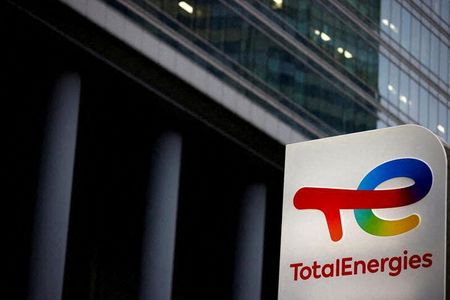 1
1 1
1

By Geert De Clercq and Shadia Nasralla
PARIS/LONDON (Reuters) -French oil major TotalEnergies said on Tuesday it would not renew its Russian gasoil and crude oil supply contracts for its German refinery, but would source gasoil from Saudi Arabia and crude via Poland instead.
The firm, with stakes in several Russian projects, has come under criticism after it stopped short of joining rivals Shell <SHEL.L> and BP in planning to divest oil and gas assets in Russia.
European sanctions and Russian laws controlling foreign investment prevents TotalEnergies from finding a non-Russian buyer for its assets, it said. “Abandoning these interests without consideration would enrich Russian investors, in contradiction with the sanctions’ purpose.”
TotalEnergies aims to satisfy 10% of global LNG markets by 2025 with 50 million tonnes a year. Russia is a key source, via the Yamal LNG project and the not-yet-operational Arctic LNG 2 project.
The French firm said it would “no longer record proved reserves for Arctic LNG 2 in its accounts and will not provide any more capital for this project.” It did not immediately respond to a request for comment.
BP is facing write-downs of $25 billion for its Russian exit and Shell of over $3 billion.
DRUZHBA EXIT
TotalEnergies said on Tuesday it would not renew crude supply contracts for its 240,000-barrel-per-day Leuna refinery in Germany, which gets fed with Russian oil via the Druzhba pipeline.
Leuna, far from Germany’s ports near the city of Leipzig, would be fed with oil via Poland, although TotalEnergies’ statement was unclear about the source.
Having already stopped spot purchases of Russian fuel, TotalEnergies said an end to its longer-term contractual supplies from Russia means the last crude and oil products would be imported by the end of this year.
TotalEnergies said that in accordance with the European Union’s decisions to maintain Russian gas supplies at this stage, it would continue to supply Europe with liquefied natural gas from the Yamal plant as long as Europe’s governments consider that Russian gas is necessary.
(Reporting by GV De Clercq and Shadia Nasralla, additional reporting by Benjamin Mallet, Editing by Jane Merriman, Jan Harvey, Paul Simao and Richard Chang)